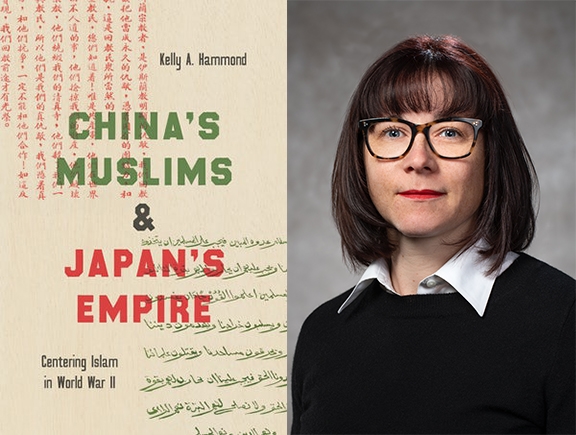A new book by history professor Kelly Hammond explores the relationship between Japanese imperialism and their efforts at attracting Chinese Muslims to their cause during World War II.
Published by the University of North Carolina Press, China's Muslims and Japan's Empire: Centering Islam in World War II is a transnational history of Japan's efforts to secure their hold on China, subvert the global capitalist world order, and destabilize the Soviet Union.
In the book, Hammond places Sino-Muslims at the center of imperial Japan's challenges to Chinese nation-building efforts. Revealing the little-known story of Japan's interest in Islam during its occupation of North China, Hammond shows how imperial Japanese aimed to defeat the Chinese Nationalists in winning the hearts and minds of Sino-Muslims, a vital minority population. Offering programs that presented themselves as protectors of Islam, the Japanese aimed to provide Muslims with a viable alternative — and, at the same time, to create new Muslim consumer markets.
This history can be told only by reinstating agency to Muslims in China who became active participants in the brokering and political jockeying between the Chinese Nationalists and the Japanese Empire. Hammond argues that the competition for their loyalty was central to the creation of the ethnoreligious identity of Muslims living on the Chinese mainland. Their wartime experience ultimately helped shape the formation of Sino-Muslims' religious identities within global Islamic networks, as well as their incorporation into the Chinese state, where the conditions of that incorporation remain unstable and contested to this day.
China's Muslims and Japan's Empire has drawn early praise. Professor David Atwill of Penn State University said Hammond's work "is a groundbreaking examination of Japan's efforts to forge Muslim alliances across 1930s and 1940s Asia. … The result is a historical tale replete with extravagant enticements, shadowy intrigue, and diplomatic conspiracies."
Likewise, University of North Carolina-Chapel Hill historian Cemil Aydin calls Hammond's work "a bold critical view of the dominant narratives of modern China and East Asia" with the book demonstrating "why this history matters for contemporary struggles around minority rights and human dignity."
Hammond is an assistant professor of history in the Fulbright College of Arts and Sciences at the University of Arkansas.
Contacts
Jim Gigantino II, chair
Department of History
479-575-7332, jgiganti@uark.edu
